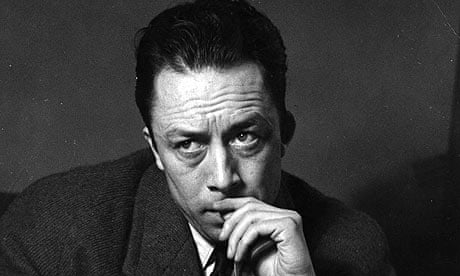"What they did not like," wrote Albert Camus of his fictionalised double in his unfinished last novel, The First Man, "was the Algerian in him."
Fifty years after the death of the Nobel prize-winning author of The Outsider, it appears that it is the Frenchman in the Algerian-born Camus that Algerians don't like: the colonial taint.
For while France has enthusiastically marked last month's 50th anniversary of his death in a car crash with his publisher Michel Gallimard near the French town of Sens, planned celebrations of Camus's life and works in Algeria have been described either as un flop or invited hostility, dividing Algerian intellectuals over the writer's political legacy in a country where he is rarely taught in its schools.
The latest row over how Camus should be remembered comes hard on the heels of French President Nicolas Sarkozy's controversial suggestion that Camus's remains be re-interred inside the Panthéon alongside other giants of French literature including Victor Hugo, Rousseau and Voltaire, a move opposed by many on France's left, as well as Camus's own son, who believe the writer would have been appalled by the idea.
It is not, however, Camus's writing that is inspiring hostility in the country of his birth but rather the position he adopted during the Algerian war, a largely isolated humanist stance that emphasised the cost to the war's victims and earned him enemies on both sides.
To his Algerian detractors, the author of The Fall, The Plague and The Rebel remains not the country's only Nobel laureate but a sympathiser with the European pied noir colonialists, supporting France and rejecting independence for Algeria. A man who was silent on French military abuses.
His supporters point to Camus's insistence that both sides in the "dirty war" should respect the lives of civilians, advocating a ceasefire, and defending Algerian prisoners facing the guillotine.
The consequence has been that, while the anniversary of his death has seen a series of high-profile events in France, in Algeria it has prompted a debate about whether Camus should still be read at all – indeed, whether Camus is "defensible" – and has provoked the circulation of a petition, "Alert for the Anticolonial Conscience", denouncing attempts to mark the anniversary as a covert attempt to "rehabilitate the [colonial] French-Algerian discourse".
That petition, as well as comment pieces in the Algerian press, has been prompted by the proposed visit to seven Algerian cities of the Camus Caravan, a travelling programme of events dedicated to Camus's life organised jointly by Sabah M'Rakach, an Algerian, and Guillaume Luchelli, a Frenchman.
Not everyone has been enthused by the petition. Among its opponents has been the Arab newspaper El Khabar, which has condemned those "holier-than-thou types engaged in the pursuit of all who read Camus".
And while the anti-Camus camp remains convinced that he was in essence a colonialist writer, the reality of his position was more complex.
Camus viewed the independence struggle as less interested in advancing the lives of poor Algerians, whose conditions he had described in his journalism, but rather as an expression of Egyptian president Gamal Abdel Nasser's pan-Arabism, encouraged by Moscow, which Camus had turned against.
Indeed, Camus believed Europeans and Algerians could and should be able to coexist – a view for which he was condemned as a traitor by many pieds noirs.
For those in the pro-independence movement he would never be forgiven for one remark, inevitably resurrected whenever he is discussed in an Algerian context: "At this moment bombs are being planted in the trams in Algiers. My mother could be on one of those trams. If that is justice, I prefer my mother."
While some see the question of Camus's legacy as relating to a question of France's continuing attempts at cultural imperialism, others believe the issue is increasingly confined to an ageing generation of Algerians who can recall the war. "It's a battle that's of interest only to the generation that is 50 or more," sociologist Abdenasser Djabi told the French daily Le Monde last week. "Young people aren't familiar with Camus."
It is precisely this issue that is bothering those Algerian editors and writers who believe that Camus should have greater, not less, recognition, and were asked in December by the website Tchachadi what place Camus should have in the country's letters.
Among those who came out in support of Camus was Sofiane Hadjadj, one of the heads of the publishing house Editions Barzakh in Algiers, who called for a more nuanced understanding of Camus. "If Mohammed Dib, Kateb Yacine and Assia Djebar are the founding fathers of Algerian literature post-independence, Camus remains part of our cultural heritage with the same claim as St Augustine. Camus is for me quite clearly an Algerian writer. He understood the reality of Algerian society. Its misery."
